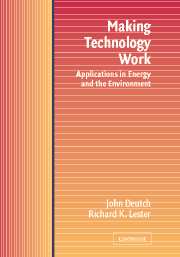Book contents
- Frontmatter
- Contents
- Preface
- 1 Introduction
- 2 Gasohol
- 3 Solar Thermal, Windpower, and Photovoltaic Technologies
- 4 Electricity from Coal
- 5 Controlling Acid Rain from Coal-fired Power Plants
- 6 Greenhouse Gases and Global Warming
- 7 Nuclear Power and Its Fuel Cycle
- 8 Managing Nuclear Waste
- 9 Nuclear Power and Weapons Proliferation
- 10 Natural Gas
- 11 Safety and Risk: Examples from the Liquefied Natural Gas and Nuclear Industries
- 12 Synthetic Fuels
- 13 Fuel Cells For Automobiles
- 14 Energy Models and Statistics
- 15 The Government's Role in Innovation
- 16 Conclusions
- Index
16 - Conclusions
Published online by Cambridge University Press: 10 December 2009
- Frontmatter
- Contents
- Preface
- 1 Introduction
- 2 Gasohol
- 3 Solar Thermal, Windpower, and Photovoltaic Technologies
- 4 Electricity from Coal
- 5 Controlling Acid Rain from Coal-fired Power Plants
- 6 Greenhouse Gases and Global Warming
- 7 Nuclear Power and Its Fuel Cycle
- 8 Managing Nuclear Waste
- 9 Nuclear Power and Weapons Proliferation
- 10 Natural Gas
- 11 Safety and Risk: Examples from the Liquefied Natural Gas and Nuclear Industries
- 12 Synthetic Fuels
- 13 Fuel Cells For Automobiles
- 14 Energy Models and Statistics
- 15 The Government's Role in Innovation
- 16 Conclusions
- Index
Summary
In the academic world, technology-oriented students mainly learn in “stove pipes” defined by established disciplines in the natural and social sciences and in engineering. This compartmentalization is understandable because the foundations of the disciplines are most easily learned separately and best taught by specialists. One must learn calculus, chemical kinetics, microeconomics, or system control before being able to address the complex relationships between these subjects that may arise in practical applications of technology. The result, however, is that students learn about the pieces of a problem rather than the whole. Moreover the learning is typically a solitary activity, and rarely depends upon the cooperation of a group.
Yet real problems are an inseparable mix of technological, economic, environmental, and political factors. As we have seen, successful application of technology frequently requires the synthesis of all these considerations. When this synthesis is absent or is not credible, the technology will fail to live up to its potential and may fail completely. And successful syntheses require individuals to work together to bring different skills to bear on the problem. We teach individual disciplines, but the resolution of most real problems requires that different disciplines be jointly brought to bear. It is as if people were taught how to play the individual musical instruments of an orchestra and then expected immediately to perform a symphony.
Students understand that they will face these sorts of problems in the course of their professional careers.
- Type
- Chapter
- Information
- Making Technology WorkApplications in Energy and the Environment, pp. 263 - 266Publisher: Cambridge University PressPrint publication year: 2003



